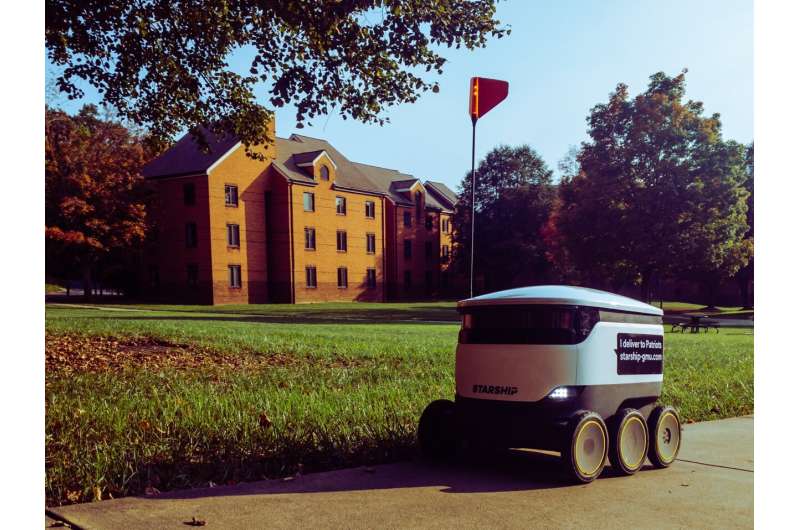
Kirkland, Wash. could be among a small selection of cities in the United States where Amazon’s small delivery robots scoot along sidewalks, through crosswalks and up driveways to bring packages to waiting residents.
But not quite yet. In a first among cities where Amazon is testing its Scout delivery system, Kirkland will not permit the autonomous personal delivery devices (APDDs) or the dispensers that house them until a moratorium from the city is lifted.
The moratorium, approved last month by the City Council, isn’t intended as a permanent ban, city officials said. Instead, Deputy City Manager James Lopez said, it provides more time to address issues like safety, zoning around the device dispensers and how residents feel about the delivery robots in their city. Lopez expects a decision in early May or June.
Amazon’s six-wheeled, battery-powered device, called Scout, looks like a cooler on wheels. It is about 2 1/2 feet long, 2 feet wide and weighs about 100 pounds. The devices are capable of traveling up to 15 mph, but Washington law for any APDD prohibits speeds faster than 6 mph. They can navigate around pedestrians, pets or obstacles on a sidewalk, and use a crosswalk when needed.
The retail giant began field testing the devices in 2019 in Snohomish County, where employees walked with the vehicles as they followed delivery routes. Since then, the program has expanded to testing in Bothell, Everett, Lynnwood and Mukilteo in Washington, and in Irvine, California; Franklin, Tennessee and the Atlanta area.
Altogether, the Scout devices have delivered “tens of thousands” of packages to customers in the four states, according to Jared Axelrod, Amazon’s senior manager of public policy, who spoke at a Kirkland City Council meeting in early March.
Under Washington state law, the delivery devices are allowed if they follow all rules and regulations of the city or jurisdiction where they’re operating. The devices must be under 120 pounds and have a braking system and a way for a worker to remotely control navigation and movement. The delivery robots can’t transport hazardous materials or alcohol.
“The state law has recognized this as a viable technology of the future,” Lopez said. “Amazon has been great, and we are working closely with them to do the due diligence the city needs to make sure it’s safe, aesthetically pleasing and functional.”
Kirkland received four incomplete applications for building permits in late 2021, according to the city, for the units that house the Scout devices. The dispensers are 11 feet tall, 18 feet long and 8 1/2 feet wide. The moratorium bans accepting new applications for building permits or right-of-way use permits.
The City of Everett permitted two units that house the Scout devices in mid-2021, then two more later in the year, according to city spokesperson Julio Cortes. The city is monitoring the devices’ performance and for any complaints, but it hasn’t heard of any issues, he added.
In Kirkland, city leaders have voiced their support for the potential arrival of the devices but expressed concerns about questions they didn’t yet have answers for. Among them: Could they obstruct sidewalks? How will a company prevent packages being stolen from the devices? Will the city need to charge a usage fee for the public walkways?
“The technology is exciting, but I think we need to make sure we cross our T’s and dot our I’s,” Kirkland City Councilmember Kelli Curtis said at the council meeting.
As Scout is designed now, a customer would place an order on Amazon, then receive a notification that a device will make a delivery during a specific time window. A worker loads the packages into the devices at one of the local dispensers, then the Scout is sent on its way. When the robot arrives, the customer receives a second notification and retrieves the package. After the customer closes the lid, the Scout returns to its home base.
The Scout program is one way Amazon is working to meet its climate-pledge goals, Axelrod said at the City Council meeting. The company has committed to make half of all shipments net-zero carbon by 2030 and achieve net-zero carbon emissions across the company by 2040.
Amazon spokesperson Maya Vautier said feedback from Kirkland customers has helped shape the device rollout, including how to define the ideal waiting locations when making a delivery.
“Amazon Scout prioritizes public safety and it will continue to be our top priority as we expand our field testing,” Vautier said in a statement. “We welcome an ongoing dialogue with the City of Kirkland on these topics.”
Amazon rolls out ‘Scout’ delivery robots
©2022 The Seattle Times. Distributed by Tribune Content Agency, LLC.
Citation:
Washington city ambivalent about small Amazon robots scooting along streets and sidewalks (2022, March 23)
retrieved 23 March 2022
from https://techxplore.com/news/2022-03-washington-city-ambivalent-small-amazon.html
This document is subject to copyright. Apart from any fair dealing for the purpose of private study or research, no
part may be reproduced without the written permission. The content is provided for information purposes only.
Credit: Source link



















